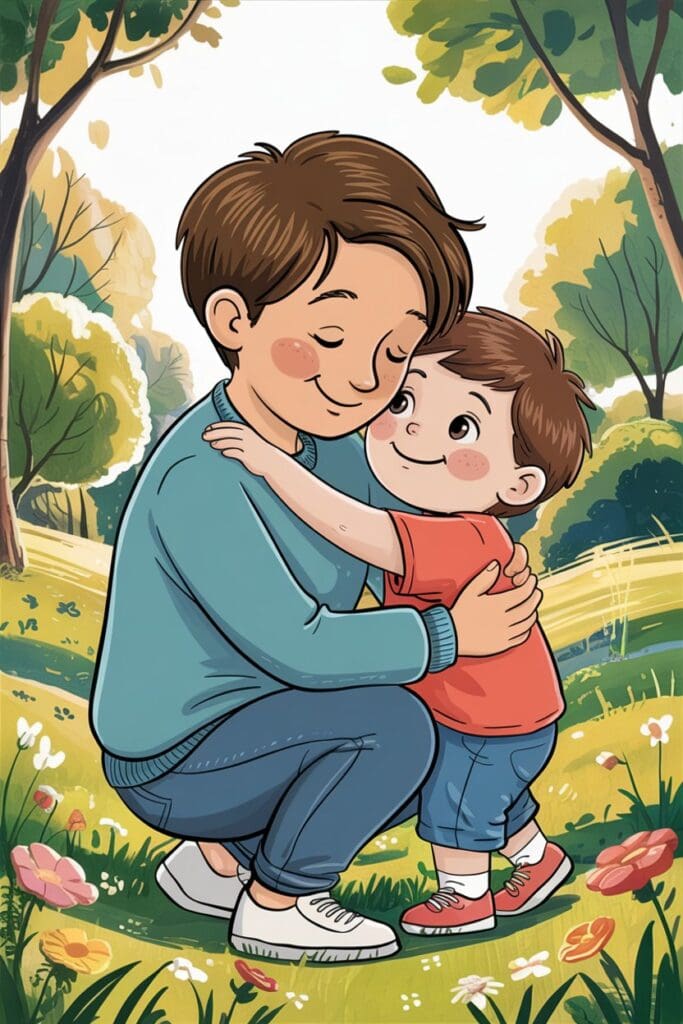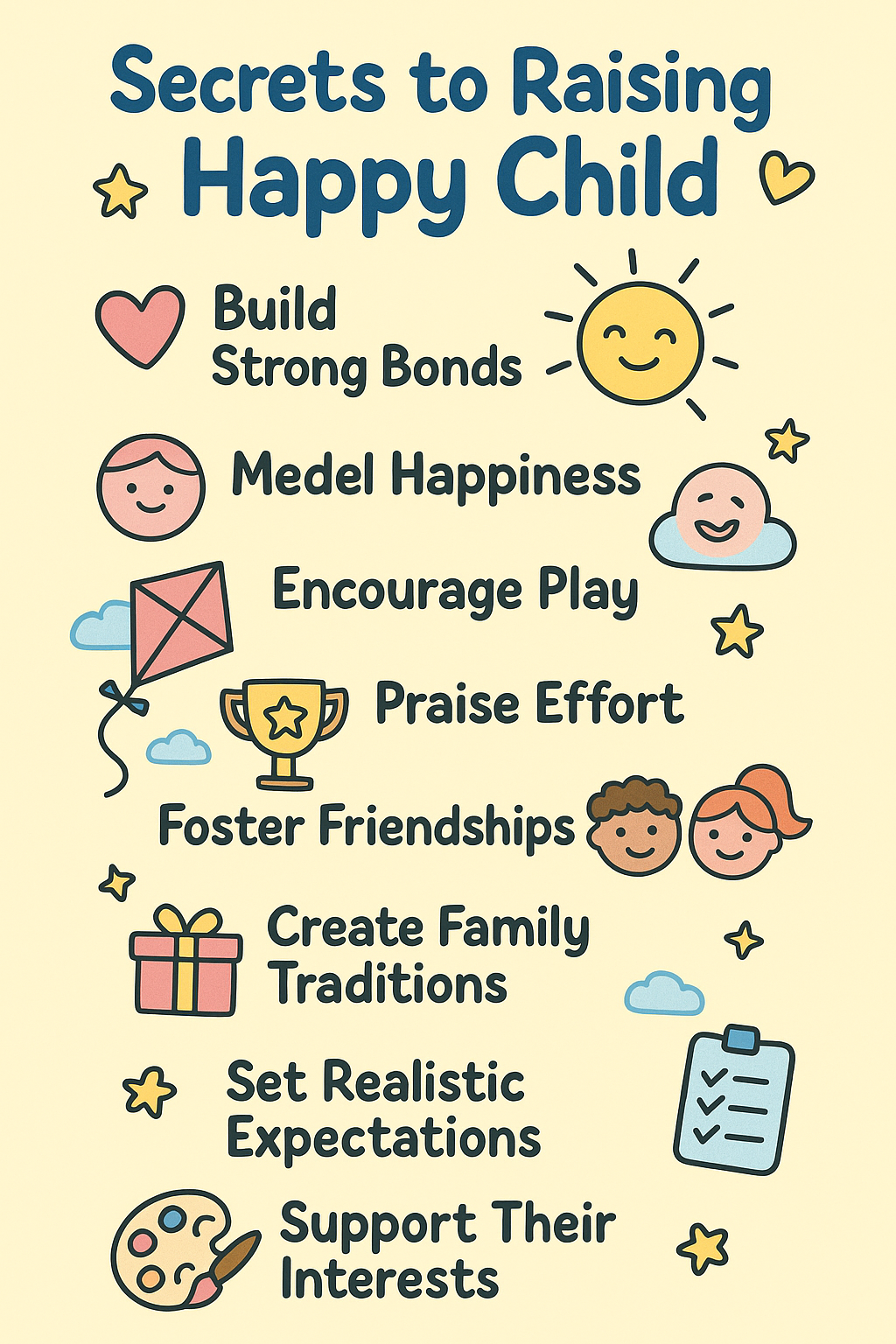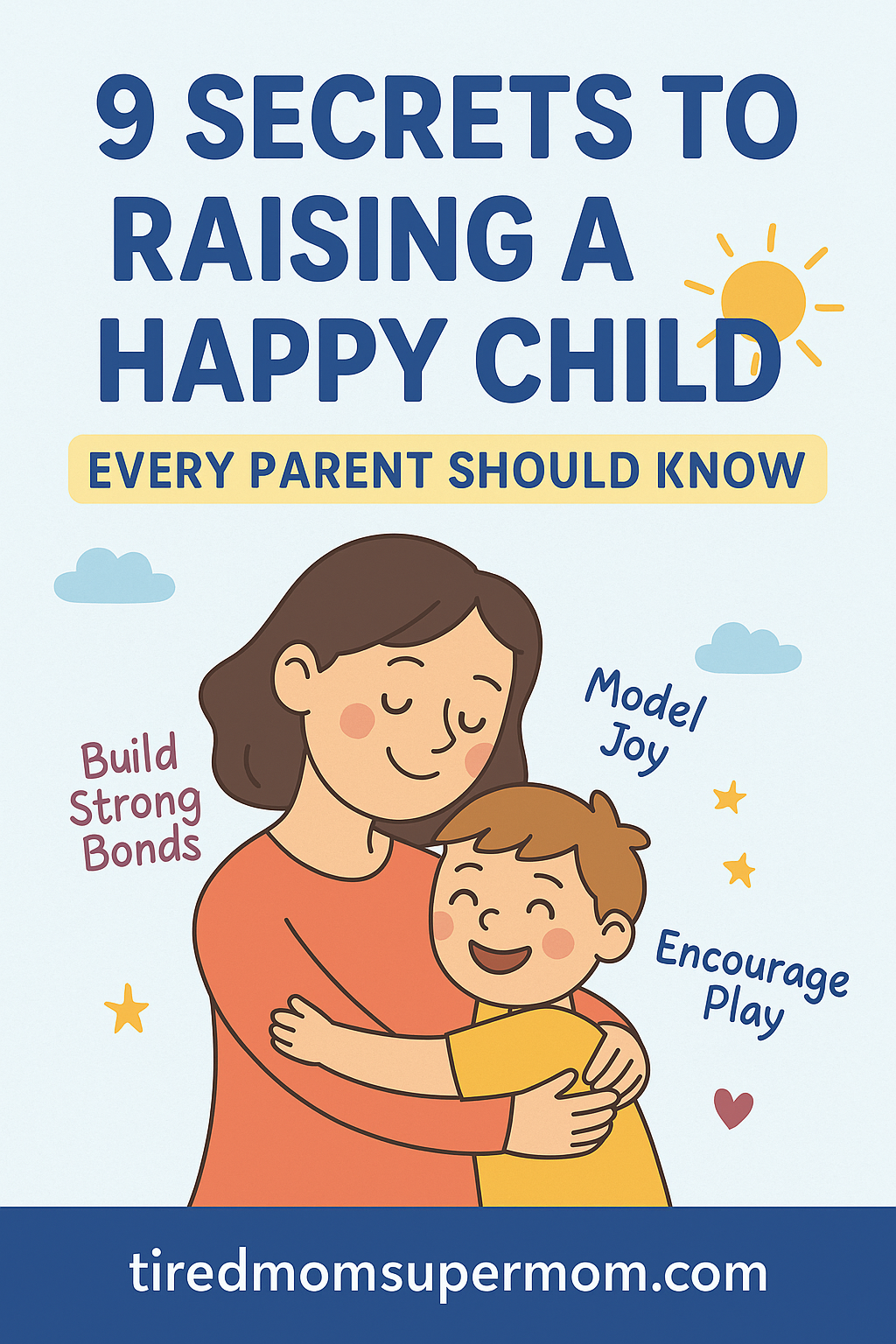How to Raise a Happy Child: 9 Simple Secrets Every Parent Should Know
Every parent dreams of raising a happy child — one who smiles easily, feels confident, and enjoys life.
But with the pressures of school, schedules, and technology, how can we actually help our kids grow up joyful and emotionally strong?
Every parent dreams of how to raise a happy child — one who is confident, resilient, and full of joy.
Heads up: This post may include affiliate links. As an Amazon Associate, I earn from qualifying purchases—at no extra cost to you. Full privacy policy and disclosure here.

Build a Strong, Secure Relationship
At the core of every happy child is a strong, trusting bond with their caregivers. Kids who feel loved, seen, and safe develop the emotional foundation needed to thrive.
Building trust and emotional safety is the first step when learning how to raise a happy child.
How to Strengthen Your Bond:
- Make time for one-on-one connection daily (even just 10 minutes of undivided attention).
- Offer physical affection freely — hugs, kisses, high fives!
- Listen actively when your child shares feelings, no matter how small.
👉 Want even more encouragement for your parenting journey? Check out these inspirational parenting quotes you need to hear.
Model Happiness Yourself
Children learn far more from what we do than what we say.
When you prioritize your own emotional well-being, you teach your child that happiness is a choice and a practice.
Remember, your own happiness habits will teach your child exactly how to raise a happy child inside themselves.
Ways to Model Joy:
- Speak kindly to yourself (yes, out loud — they’re listening).
- Find small things to celebrate each day.
- Let your child see you navigate tough moments with grace and optimism.
👉 Struggling with positive self-talk yourself? Here’s a guide to boost positive self-talk in your child (and yourself!).
Teach Emotional Resilience: A Key to How to Raise a Happy Child
It’s tempting to protect our kids from every sadness — but real happiness isn’t about avoiding all pain.
It’s about learning to handle emotions and bounce back from challenges.
Ways to Build Resilience:
- Normalize feelings by saying things like, “It’s okay to feel disappointed. Let’s talk about it.”
- Help them name emotions: “It sounds like you’re feeling frustrated.”
- Teach coping skills like deep breathing, drawing feelings, or journaling.
👉 Gentle language matters! Learn how to stop saying no and use positive phrases instead.
Let Them Play (A Lot!)
Play is not a luxury for kids — it’s a necessity for mental health, creativity, and happiness.
Free, unstructured play boosts problem-solving skills, friendships, and emotional regulation.
Encouraging regular outdoor play is one of the simplest steps you can take when learning how to raise a happy child naturally.
Encouraging outdoor adventures and imaginative play is an essential strategy for parents wondering how to raise a happy child.
Simple Ways to Encourage Play:
- Prioritize open-ended toys (blocks, dolls, balls).
- Say yes to messy activities like mud pies and water fights.
- Schedule in “nothing time” after school and on weekends.
Did you know? Studies show that just one hour of outdoor play a day can significantly boost a child’s mood and lower stress levels.
Focus on Effort, Not Outcome
Praising your child’s efforts, not just achievements, builds lasting self-esteem and a healthy inner voice.
Instead of saying, “You’re so smart!”
Try: “I’m so proud of how hard you worked on that.”
This teaches kids that happiness comes from perseverance and pride in their journey — not just winning.
Valuing effort over perfection teaches kids perseverance — a major ingredient in how to raise a happy child.
👉 Need help with specific encouraging phrases? Grab these positive reinforcement examples for kids!
Foster Friendships and Social Skills
Social connections are a huge part of raising happy kids.
Kids with strong friendships tend to be more confident, empathetic, and resilient.
Ways to Support Social Growth:
- Arrange casual playdates or invite neighbors for backyard fun.
- Teach friendship-building skills like sharing, turn-taking, and showing interest in others.
- Celebrate kindness more than popularity.
Remember: Even just one good friend can make a world of difference in a child’s emotional life.
Following your child’s unique interests is a joyful and empowering part of how to raise a happy child.
Create Family Traditions
Family rituals create a strong sense of belonging and positive memories that fuel happiness for life.
Easy Family Tradition Ideas:
- Saturday morning pancake breakfasts.
- Evening walks after dinner.
- Seasonal traditions like apple picking or holiday movie nights.
These simple rituals don’t have to be fancy — it’s the togetherness that matters most.
Set Realistic Expectations
Perfectionism is a happiness killer.
If we expect constant success from our kids (or ourselves), we set them up for stress and disappointment.
How to Set Healthy Expectations:
- Celebrate effort over perfection.
- Let kids know that mistakes are part of learning.
- Keep academic, sports, and behavior goals realistic for their age and temperament.
When kids feel that love isn’t tied to achievement, they’re free to experience real joy.
One of the most powerful tools for raising happy kids is modeling genuine happiness in your own daily life.
Support Their Interests (Not Yours)
Your child may love things you don’t understand — bugs, anime, soccer, rock collecting.
Supporting their passions shows that you value them for who they are, not who you want them to be.
How to Support Their Unique Passions:
- Get curious: Ask questions about what they love.
- Celebrate milestones in their interests (like a bug collection reaching 20 insects!).
- Provide resources: books, classes, supplies that align with their passions.
This is the secret to raising kids who are not just happy — but also confident and self-motivated.
Managing expectations realistically is essential when considering how to raise a happy child who feels secure and loved for who they are.
Bonus Tip: Positive Discipline Creates a Happier Home
Punishment and yelling create fear, not happiness.
Positive discipline, on the other hand, teaches kids how to do better next time — without crushing their spirit.
👉 Need practical help? My no yelling parenting toolbox is packed with strategies to stay calm while setting firm, loving boundaries.
Why Positive Parenting Creates Happier Kids
Positive parenting isn’t about being permissive or indulgent. It’s about setting boundaries with love, focusing on growth, and respecting your child’s inner world.
Research shows that positive parenting:
- Boosts a child’s emotional intelligence
- Strengthens the parent-child bond
- Leads to higher life satisfaction into adulthood
👉 If you’re new to this approach, here’s why taking parenting classes can be life-changing.

FAQ: Raising a Happy Child
If you’re still wondering about specific techniques for how to raise a happy child, here are answers to some common parenting questions!
Studies show that play is critical for children’s emotional development and happiness. According to Harvard University’s Center on the Developing Child, free play helps kids build crucial life skills like problem-solving, creativity, and emotional resilience.
What are the top 3 factors that make a child happy?
The three biggest factors are:
A secure attachment to caregivers.
Freedom to play and explore.
Feeling unconditionally valued.
How can I teach my child to handle emotions?
Normalize all emotions (“It’s okay to be mad”), teach coping skills (deep breathing, drawing, talking), and model healthy emotional regulation yourself.
Does praising kids too much spoil them?
Not when you praise effort and character traits, like perseverance or kindness, rather than constant results.
How much playtime is healthy?
Experts recommend at least 60 minutes of unstructured free play daily, especially for younger children.
Can happiness really be taught?
Yes! Happiness is a combination of temperament and skills. By teaching gratitude, resilience, emotional regulation, and social skills, you’re setting your child up for a joyful life.
Can happiness really be taught?
Yes! Teaching gratitude, emotional resilience, and optimism are key elements of how to raise a happy child who thrives long-term.
Final Thoughts: You Don’t Need to Be Perfect — Just Present
Raising a happy child isn’t about doing everything right — it’s about being there, being real, and loving them through it all.
Your daily hugs, kind words, goofy dances, and bedtime stories build a foundation of happiness that no storm can shake.
These simple strategies for how to raise a happy child can create joy that lasts a lifetime — for both you and your little one!
Keep it simple. Keep it joyful. You’ve got this. 💛
Quick Resources to Support You
✅ Essential Positive Parenting Tools
✅ Inspirational Parenting Quotes to Keep You Going
✅ Positive Reinforcement Examples for Kids
Ready to raise happier, more confident kids? 📌 Save this Pin for easy parenting inspiration when you need it most!
(Pin it now and come back to these simple happiness secrets anytime you need a boost!)

